Static sites offer fast page load times, are easy to manage, and highly secure. However, they can’t run back-end code which limits what features you can and cannot add to your website. This means you won’t be able to add forms on a static site for collecting, validating, and storing user data.
You need a solution that lets you handle form submissions seamlessly. In addition to this, you also need other useful features like sending email notifications, setting autoresponders, and integrating with other platforms and systems.
In this roundup, we’ll run the rule over some of the best tools for displaying forms on a static website and highlight their standout features.
Table of Contents
#1: Reform
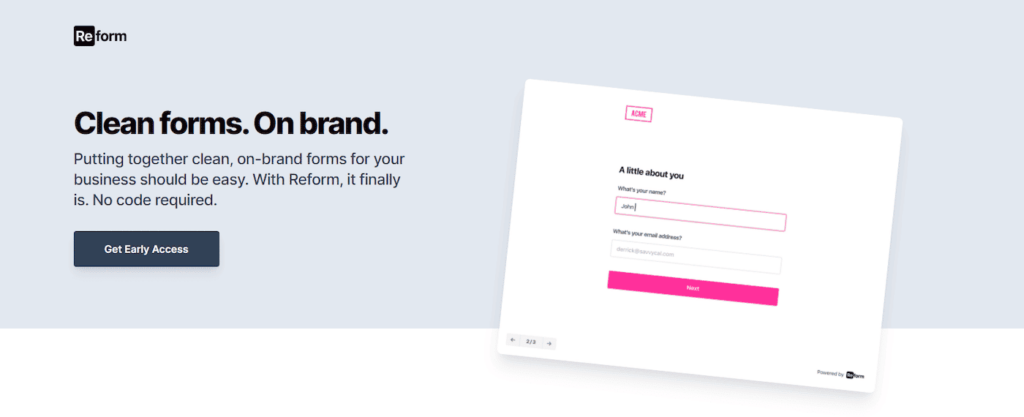
Reform is a popular static site form builder that enables you to design and show clean and customizable forms on your website. It is an ideal tool for capturing leads, gathering user feedback, conducting product and customer research, and receiving job applications.
Key features:
- Reform allows you to build great-looking forms that showcase your brand, including a logo and color palettes.
- You can choose to create single or multi-page forms based on your particular requirements.
- Its powerful analytics feature gives you important insights into respondents’ behavior so you can optimize your site forms for better results. Moreover, you can easily review this data in Reform or import it to a spreadsheet or another analytics tool.
- Reform seamlessly integrates with your existing no-code tech stack. You can also connect it directly with your software using webhooks.
- Reform stores your forms in a self-hosted CDNStands for Content Delivery Network. It’s a system of distributed servers that deliver web content quickly to users base…, enabling you to deliver forms to users’ browsers from the geographical location closest to them.
- All your forms will be easily accessible to your site’s users meaning anyone will be able to read and answer without any issues.
Price: Sign up for early access
#2: Formspree
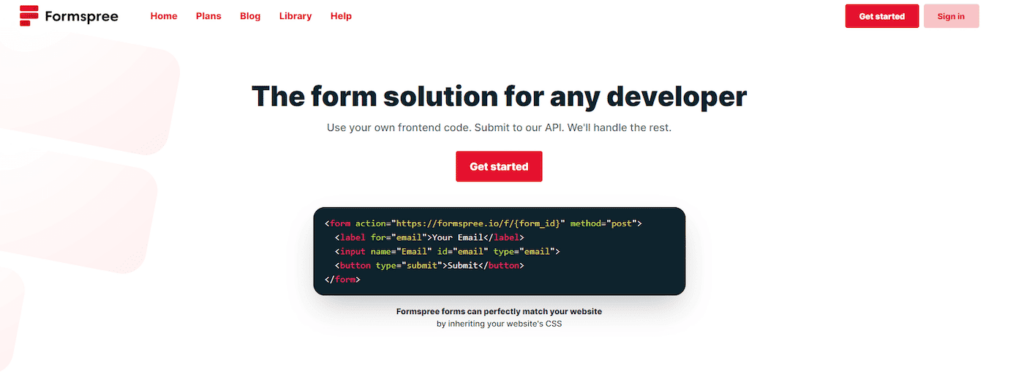
Formspree is a static site form builder that helps you create powerful JavaScriptA programming language used in web development to create interactive elements on a webpage. forms using its Formspree CLICommand Line Interface. This is a text-based way to interact with your computer or specific software, like Simply Static… and React library. You don’t need any coding skills to build site forms. Simply submit your frontend code to its API, and Formspree will generate site forms that match your website’s CSSCascading Style Sheet. It’s a language used for describing the look and formatting of a document written in HTML..
Key features:
- You can enable email notifications and auto-responses that alert you every time a user submits a form response. Use customizable email templates to automatically send next steps information, receipts, or thank you message to your users.
- Formspree lets you easily customize your forms including form fields, colors, fonts, and stylesheet.
- Formspree Inbox stores all your form submissions. You’ll be able to see submissions, view daily analytics reports, and exportThe process of saving the files and data from your WordPress site to create a static site. data to JSONJavaScript Object Notation. A lightweight format for storing and exchanging data. or spreadsheets.
- Formspree seamlessly integrates with many popular integrations including Freshdesk, Google Sheets, Hubspot, Airtable, ConvertKit, Discord, Stripe, and Mailchimp.
- This form builder offers a number of tools to help you prevent spam form submissions such as Akismet, reCAPTCHA, and custom rules.
Price:
- Personal version costs $8 per month
- Professional version costs $18 per month
- Business version costs $85 per month
#3: Static Forms
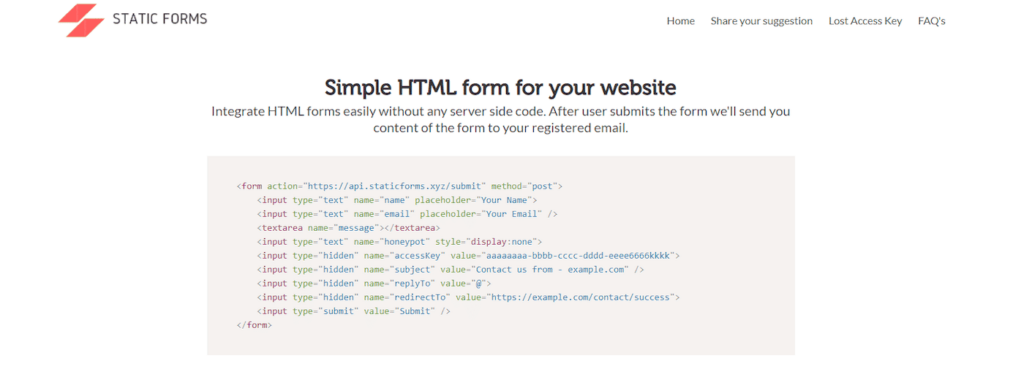
Static Forms is a simple form builder that lets you handle your form submissions. It enables you to easily integrate HTMLHyperText Markup Language. It’s the standard language for creating web pages. forms with your website without any server-side code.
Key features:
- When someone submits a form, Static Forms will send its contents to your registered email.
- Static Forms supports JSON content types for direct HTML form submission.
- You can protect your site from spam content submissions by adding a single line of code to Static Forms code.
- It doesn’t store your emails (or form data). Instead, it sends them directly to you through Amazon SES.
- You can quickly create your site forms using predefined fields and by adding custom fields.
Price: Free
#4: FormKeep
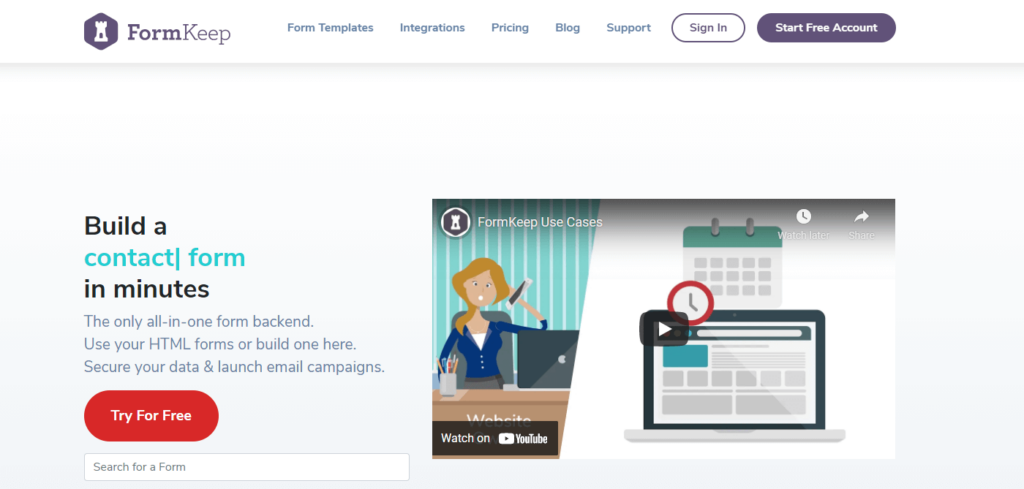
FormKeep is a static site form builder that allows you to add forms on a static site. You can create great-looking forms without hiring a developer. It can be used to capture sales leads, set up reservations, receive submissions, or add subscribers to a newsletter or mailing list.
Key features:
- FormKeep sends email and Slack notifications to your team every time a user submits a form. You can also set automated follow-up emails to tell them about the next steps or send a thank you message.
- Its powerful spam filtering feature lets you stop bots from fake form submissions. You’ll also be able to add a reCAPTCHA field to your forms.
- FormKeep gives you dedicated, hosted landing pages for your site’s forms.
- It offers seamless integrationThe act of combining different systems, software, or functionalities to work together as a unified whole. with various services including email, Zapier, Slack, and Google Sheets.
- Your forms will look great on all devices regardless of the screen size.
- FormKeep enables you to add team members to specific forms with a view or edit roles
Price:
- Free version available
- Essential version costs $4.99 per form
- Professional version costs $6.50 per form
- Premium version costs $5.90 per form
#5: Getform
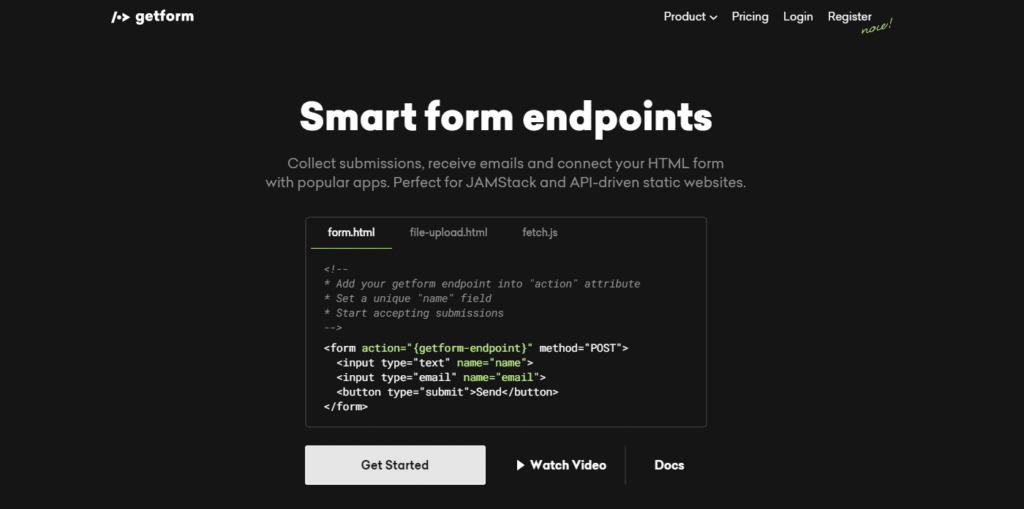
Getform is a form builder tool for static sites that helps you collect submissions from your users. It is built to meet the needs of agencies, developers, freelancers, and enterprises.
Key features:
- Getform notifies you via email every time someone submits a form on your website. You can also set up a customized auto-response email to send the next steps or thank you messages to your form submitters.
- It lets you store up to 25GB of files; supported formats include .jpg, .png, .pdf, .zip, and .doc. You can preview and download files from the Getform dashboard or from email notifications.
- Getform has a powerful spam protection system. You can also use Akismet and reCAPTCHA to identify and prevent spam submissions.
- You can easily integrate Getform with any of the development frameworks, JAMStack, and CMS platforms without adding any code. These include Next.js, React.js, Nuxt.js, Vue.js, and Gatsby.js.
- Getform offers integration with many popular tools via Zapier and Getform API including Google Sheets, Mailchimp, Salesforce, Slack, and Airtable.
Price:
- Free version available
- Start version costs $7.50 per month billed yearly
- Grow version costs $32.50 per month billed yearly
#6: FormBucket
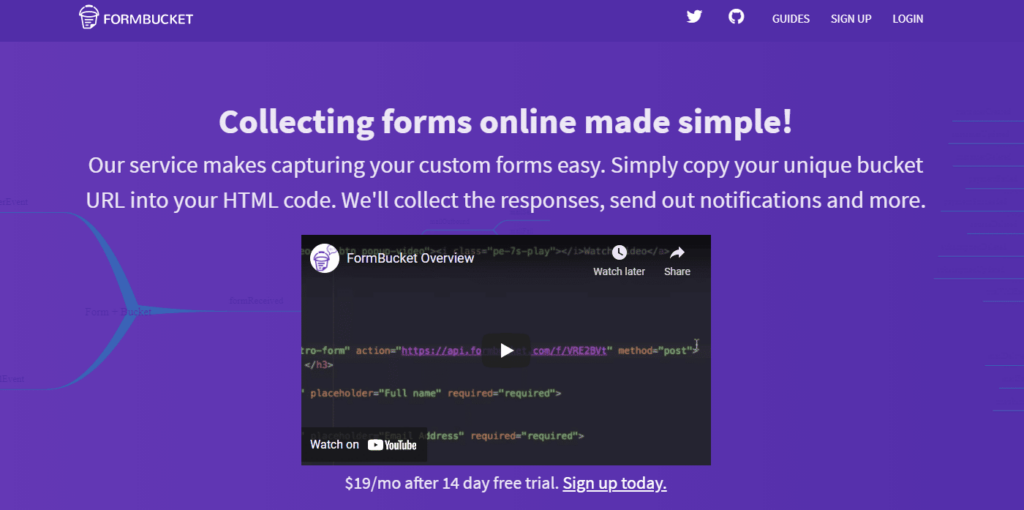
FormBucket is a handy form builder for static websites that helps you add forms on a static site.
Key features:
- FormBucket stores your forms in a bucketIn the context of Amazon AWS S3, a bucket is a storage location where your static files can be uploaded. and assigns a unique URL to it. You can quickly set up the form by copying and pasting the URL into your HTML code.
- When the user submits a form, they’ll be redirected back to your website.
- You can receive customizable email notifications every time new submissions are received. FormBucket will automatically send customized emails to users who submit forms on your website.
- All your form submissions are collected and stored in a searchable database. You can easily export this data to spreadsheets and JSON.
- FormBucket’s powerful spam prevention system stops bots from filling out and submitting forms with fake or irrelevant information.
- You can easily integrate FormBucket with other systems using webhooks.
- With FormBucket, you’ll be able to build site forms with custom HTML and CSS. You don’t need scripts or overrides.
Price:
- 14 day free trial available
- Monthly version costs $19
#7: Formcarry
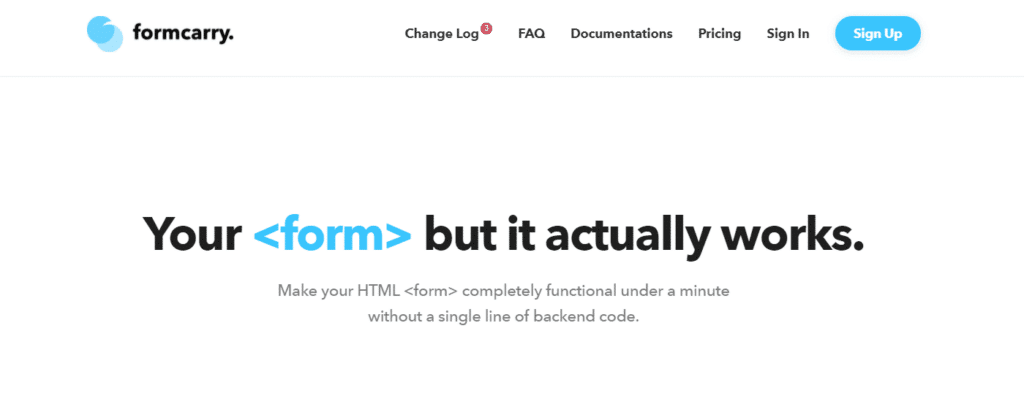
Formcarry is a helpful form builder for static websites that helps you add forms on a static site and collect information from site users in an effective and GDPR-compliant way. You can quickly set up forms on your website without needing to code.
Key features:
- Formcarry notifies you by email every time a user submits a form on your website. It lets you generate and send auto-response emails that include the respondent’s submission data.
- It can easily stop 99% of spam submissions without any problems.
- Users will be able to upload files and images to your HTML forms without any coding required on your part.
- It is a GDPR-compliant form builder and comes with powerful security features to protect your data.
- You can use webhooks to get notified about incoming form submissions.
- Formcarry lets you export and process form data in spreadsheets.
- It supports integration with many popular apps and platforms including Mailchimp, Google Sheets, Slack, Zapier, Salesforce, and Eventbrite.
Price:
- Free version available
- Start version costs $15 per month billed yearly
- Growth version costs $40 per month billed yearly
#8 Basin
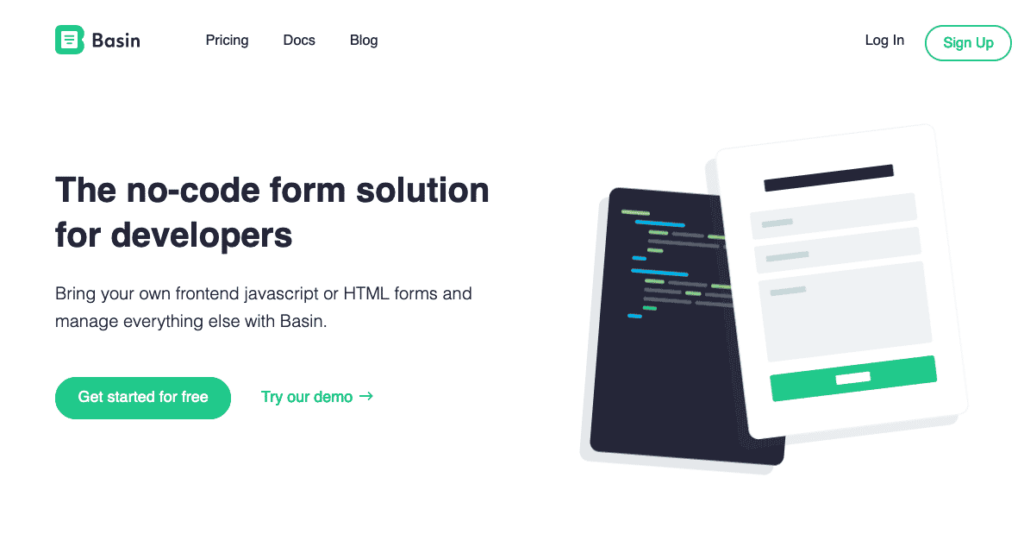
Basin is another solution to handle forms on a static website. The integration is as easy as adding the action URL for your form to Basin. Interesting features here are the e-mail templates and the redirects on a per-form level. This gives you huge flexibility in setting up your funnels and ensures consistent branding over the entire workflowIn a software development context, a workflow is a set of processes and tools for automating the deployment and operatio….
Key features:
- Custom HTML forms, and you only have to add the action URL
- Custom redirects after the visitor submit the form
- Custom e-mail templates to match your own branding
- Spam handling with AI, Google ReCaptcha, and honeypots
- Postmark integration for reliable e-mail delivery
Price:
- Free version available
- 14-day free trial for payed versions
- Standard version for $8 per month
- Premium version for $24 per month
Conclusion: Forms on a static site
We looked at various solutions to add forms on a static site and covered their standout features. These form tools let you add dynamic behavior to your static site including collecting, validating, and storing user data from lead forms, registration forms, survey forms, and feedback forms. The form builder you end up using on your static site will depend on your specific requirements and budget.
Simply Static Pro
The static site generator for WordPress. Better security and performance for your WordPress website.